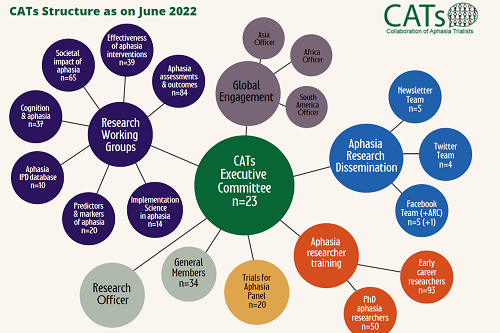Led by Glasgow Caledonian University, City and three further UK and Ireland institutions, the Collaboration of Aphasia Trialists (CATs) has been shortlisted for International Collaboration of the Year at the Times Higher Education (THE) Awards 2022.
By Mr Shamim Quadir (Senior Communications Officer), Published
The Times Higher Education (THE) International Collaboration of the Year award recognises exceptional projects or joint ventures carried out between a UK or Irish institution and one or more international partners.
The award focuses on collaborations at a strategic level, and is open to teams in any discipline or department.
This year, the Collaboration of Aphasia Trialists (CATs), led by Glasgow Caledonian University, City, University of London, University College London, Trinity College Dublin and OÉ Gaillimh (NUI Galway) has been shortlisted for the award, which will be decided and presented at the THE Awards on Thursday 17th November, 2022.
Aphasia is a complex language disorder caused by brain injury, most commonly stroke, and it is believed that some 350,000 people live with aphasia in the UK today.
People with aphasia have difficulty producing language and understanding language. They can face a wide range of difficulties including job loss, social isolation, and stigma in part due to the ‘hidden’ nature of the disorder.
CATs facilitates aphasia research collaboration across 40 countries to improve the quality and effectiveness of treatment and support for people with aphasia internationally.

Map of CATs network structure as of June 2022
Its initial network of 13 academics consisted of four research groups across six countries, and focused on stroke-related aphasia, which is the most common cause.
However, the collaboration now supports 273 researchers within seven research groups, across 41 countries, speaking 43 languages and addressing aphasia of any neurological cause.
CATs develops resources and accessible templates to help its members undertake aphasia research and deliver clinical services. It facilitates the involvement of people with aphasia in the research process as lived-experience experts and participants. CATs also facilitates the dissemination of research reports to people with aphasia, through collaboration with aphasia charities, Twitter, and Facebook groups.
Ambitious international CATs projects include the creation and analysis of a large aphasia research database of 5,928 individual participant data, which has highlighted associations between therapy intensity, dose, frequency, and best recovery, and is changing international clinical guidelines and services for people with aphasia.
Linguistic and cultural adaptations of assessments across 32 languages will support future multilingual, international aphasia research and clinical activities.
Membership of CATs is also free, one of many steps taken to ensure equitable partnership in the collaboration from members across the world.
Katerina Hilari, Professor of Acquired Communication Disorders at City, University of London and lead of the Trials for Aphasia Panel of CATs said:
Professor Marian Brady, CATs collaborator and Research Group Lead for Living with Stroke at the Nursing, Midwifery and Allied Health Professional Research Unit (NMAHP-RU) at Glasgow Caledonian University said:
"Thanks to European funding, and more recently support from the Tavistock Trust for Aphasia, our collaborative approach has supported aphasia researchers from a range of disciplinary backgrounds, languages and locations across the world to work effectively together to benefit the lives of people with aphasia. We are delighted that our collaboration has been shortlisted as a THE Awards international collaboration of the year."
Dr Lucy Dipper, Department Lead, Language and Communication Sciences, at City, University of London said:
"CATs is such an important collaboration because it co-ordinates effort, pools expertise, enhances the rigour of our work, and reduces research waste. All of this helps improve research and clinical practice, and ultimately benefits people living with aphasia. It good to see this important work recognised in this year’s THE awards."
John Gill, THE editor, said of the THE awards this year:
“This is the 18th year that the THE Awards will celebrate the best that UK higher education has to offer, across 20 categories covering all aspects of university activity.
"Once again, the shortlists reflect universities doing extraordinary things in extraordinary times, during the 2020-21 academic year, when the pandemic continued to force higher education and all who work in it to respond to an unprecedented challenge.
"That universities did so with alacrity and creativity is clear from the truly exceptional stories told in the awards submissions, and we had over 550 in all – among the highest number ever.
"All of us at THE are looking forward to celebrating with those shortlisted when we get together for the ‘Oscars of higher education’ in November.”
Find out more
Visit the Collaboration for Aphasia Trialists website.
Visit the THE Awards 2022 page.
Visit City, University of London’s Centre for Language and Communication Sciences Research webpage.
